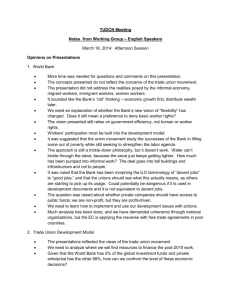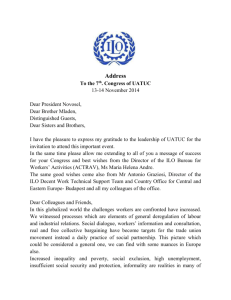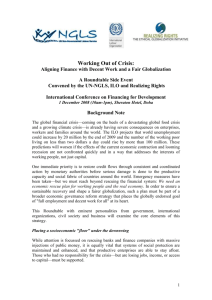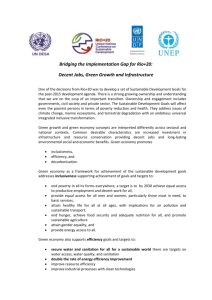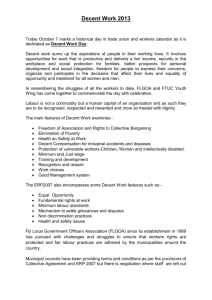conclusions - World Day for Decent Work
advertisement
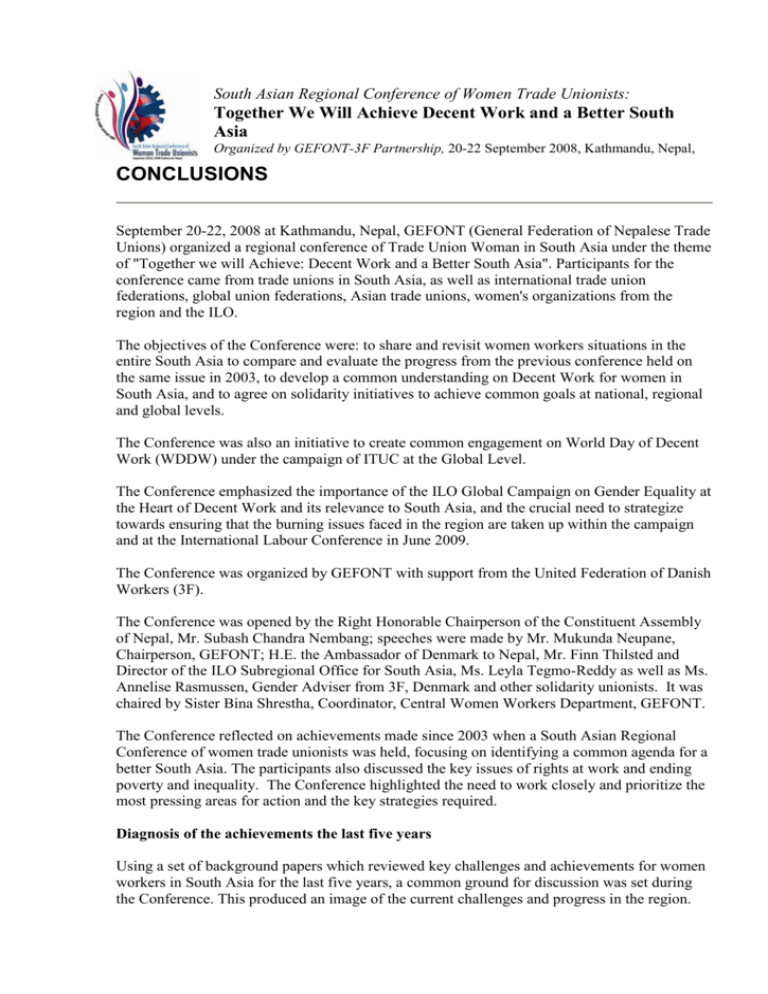
South Asian Regional Conference of Women Trade Unionists: Together We Will Achieve Decent Work and a Better South Asia Organized by GEFONT-3F Partnership, 20-22 September 2008, Kathmandu, Nepal, CONCLUSIONS September 20-22, 2008 at Kathmandu, Nepal, GEFONT (General Federation of Nepalese Trade Unions) organized a regional conference of Trade Union Woman in South Asia under the theme of "Together we will Achieve: Decent Work and a Better South Asia". Participants for the conference came from trade unions in South Asia, as well as international trade union federations, global union federations, Asian trade unions, women's organizations from the region and the ILO. The objectives of the Conference were: to share and revisit women workers situations in the entire South Asia to compare and evaluate the progress from the previous conference held on the same issue in 2003, to develop a common understanding on Decent Work for women in South Asia, and to agree on solidarity initiatives to achieve common goals at national, regional and global levels. The Conference was also an initiative to create common engagement on World Day of Decent Work (WDDW) under the campaign of ITUC at the Global Level. The Conference emphasized the importance of the ILO Global Campaign on Gender Equality at the Heart of Decent Work and its relevance to South Asia, and the crucial need to strategize towards ensuring that the burning issues faced in the region are taken up within the campaign and at the International Labour Conference in June 2009. The Conference was organized by GEFONT with support from the United Federation of Danish Workers (3F). The Conference was opened by the Right Honorable Chairperson of the Constituent Assembly of Nepal, Mr. Subash Chandra Nembang; speeches were made by Mr. Mukunda Neupane, Chairperson, GEFONT; H.E. the Ambassador of Denmark to Nepal, Mr. Finn Thilsted and Director of the ILO Subregional Office for South Asia, Ms. Leyla Tegmo-Reddy as well as Ms. Annelise Rasmussen, Gender Adviser from 3F, Denmark and other solidarity unionists. It was chaired by Sister Bina Shrestha, Coordinator, Central Women Workers Department, GEFONT. The Conference reflected on achievements made since 2003 when a South Asian Regional Conference of women trade unionists was held, focusing on identifying a common agenda for a better South Asia. The participants also discussed the key issues of rights at work and ending poverty and inequality. The Conference highlighted the need to work closely and prioritize the most pressing areas for action and the key strategies required. Diagnosis of the achievements the last five years Using a set of background papers which reviewed key challenges and achievements for women workers in South Asia for the last five years, a common ground for discussion was set during the Conference. This produced an image of the current challenges and progress in the region. Other papers focused on rights at work and poverty and inequality analyzed the current situation with basic emphasis on women workers. The papers highlighted the extreme difficulties and disparities faced by women workers and pointed out a number of solutions and practical recommendations. Individual country presentations were made by the participants both from South Asia and from other countries. From this platform, the Conference further established two working groups to discuss a common agenda to achieve decent work for women in South Asia and solidarity initiatives which should be launched at national, regional and global levels. The participants recognized the strengths and skills of women trade union leaders in South Asia, to raise the issues and demands of women workers to struggle for the creation of an equal world. 1. Common Agenda on Decent Work for Women in South Asia The vast majority of workers in South Asia (particularly women) are in the informal economy. Decent work, and the four pillars upon which it is based, need to become a reality for all in South Asia. This requires that Governments, Employers, Trade Unions and others commit resources and focus initiatives particularly in relation to decent work deficits faced by informal economy workers. The burning priorities to achieve Gender Equality in South Asia are: 1. Recognizing the work performed by women, ensuring pay equity and decent wages. 2. Giving value to the unpaid work performed by women (e.g. Venezuelan case where poor women housewives now receive a minimum wage) including housework, child care, care of elderly and disabled relatives. 3. Extending social protection to all, with an emphasis on maternity protection, health protection, old age and survivor pensions and food security; 4. Ensuring that reproductive health is a key element of occupational safety and health initiatives; 5. Sharing of family responsibilities of children and the elderly; 6. Ensuring the existence of quality and accessible child care facilities; 7. Ending violence against women, including trafficking, sexual harassment, forced and bonded labour; 8. Providing access to quality education, skills and adult literacy; 9. Providing occupational choices and relevant training; 10. Promoting jobs which are environmentally-friendly and sustainable; 11. Organizing women, giving political power and voice and strengthening institutions of social dialogue, ensuring that they are representative, prioritize women’s issues and promote women’s leadership and are representative of the workers in the informal economy; 12. Raising political awareness and consciousness through campaigns and education programmes for women. 13. Focusing on vulnerable groups, including: migrant workers, home-based workers, domestic workers, agricultural and construction workers, workers in the export processing zones (EPZ), free trade zones, workers in the garment and carpet industries, female headed households, women prisoners, persons with disabilities and women in hazardous employment, such as in mines and quarries; 14. Ensuring women’s participation in dialogue and the development of strategies, as well as their security, in conflict and post-conflict situations. 2. Solidarity to Achieve Common Goals at National, Regional and Global Levels The Conference highlighted the need for solidarity strategies to expedite measures to ensure that Decent Work for women in South Asia becomes a reality. The participants agreed on the need for a general recognition of women's work, to build a positive image of their contribution to national economic growth and to expand the Decent Work discourse to cover all workers; women and men, in the formal and informal economies. The suggestions for solidarity initiatives are: At the national level 1. Promoting ratifications and effective implementation of core labour standards and the four key ILO gender equality Conventions; the Equal Remuneration Convention (No. 100), Discrimination (Employment and Occupation) Convention (No. 111), Workers with Family Responsibilities Convention (No. 156) and Maternity Protection Convention (No. 183), as well as core Conventions 98 and Convention 87, and Convention 177 on Home Workers, especially focusing on gender equality and women worker's rights; 2. Promoting strong initiatives to link the issues of class, caste, ethnicity and gender in order to address both economic inequalities and social discrimination. 3. Promoting gender budgeting at all levels of all public budgets, as well as in trade unions; 4. Campaigning for equal distribution of resources between women and men; 5. Engaging in, or continuing with, cooperation between women's committees; 6. Providing issue-based unity at work place level, issue-based and political concerns at the national level; 7. Initiating local and national level meetings, conferences and seminars focusing on ILO procedures, the agenda item for the ILC and seeking technical assistance from the ILO, particularly the Subregional Office for South Asia and Country Offices in South Asia, when arranging such conferences and seminars; 8. Ensuring that in national Collective Action Plans issues such as globalization, privatization and the recognition of women's contribution to national economic growth are central; 9. Coordinating to create a strong demand for women's adequate (at least 33%) representation in decision-making bodies including social dialogue institutions; At the regional level 1. Putting pressure on South Asian Association for Regional Cooperation (SAARC) nations to prioritize, promote and implement Decent Work initiatives for all, Trade Union rights and a positive image of women workers; 2. Lobby and advocate for unity among ITUC and non-ITUC affiliates to work with all women trade unionists in different Trade Union federations on various issues; 3. Facilitating women trade unionists to influence national and local policies; 4. Building issue-based campaigns on the rights of women workers, focusing on the burning issues identified at this Conference. 5. Engaging in training, exposure and exchange programmes and sharing of good practices, both within and between countries. At the global level 1. Women trade unionists interests should be represented at various international meetings and conferences, such as the International Labour Conference (ILC); 2. Pressurize for gender balanced delegations to the ILC in 2009 and beyond; 3. Lobbying and advocating towards the national delegations participation on the ILC in order to ensure that issues concerning women workers rights and gender equality in the region are brought to the core of the discussions; 4. Making active use of the ILO’s competence related to various tools, research, analysis and deficits, and lessons learned, and the sharing of international experiences; 5. Ensuring an agenda mirroring the South Asian challenges for the ILO's policy, research and technical assistance work with regards to Gender Equality with the aim of contributing to the overall goal of Gender Equality; 6. In the context of globalization and the moving of production to countries with cheaper labour; seeking understanding and solidarity from partner trade unions all over the world to ensure that they, within their national contexts, push for Corporate Social Responsibility (CSR) which actually benefits women workers and involves trade unions in decision-making, and ensure workers rights throughout the full value chain. Adopted unanimously Kathmandu, 22 September 2008

